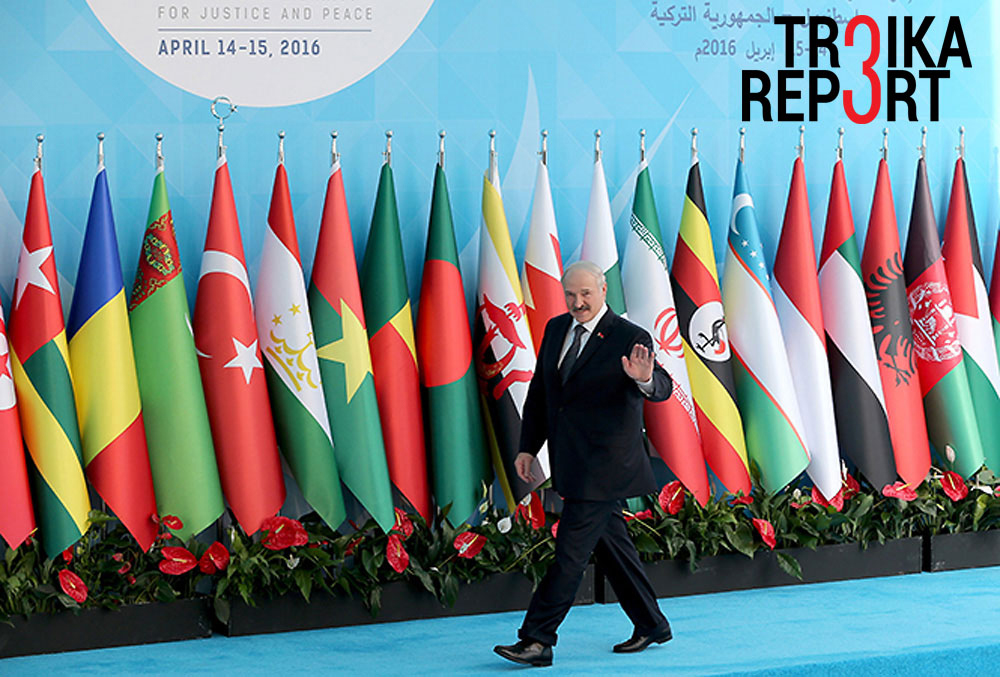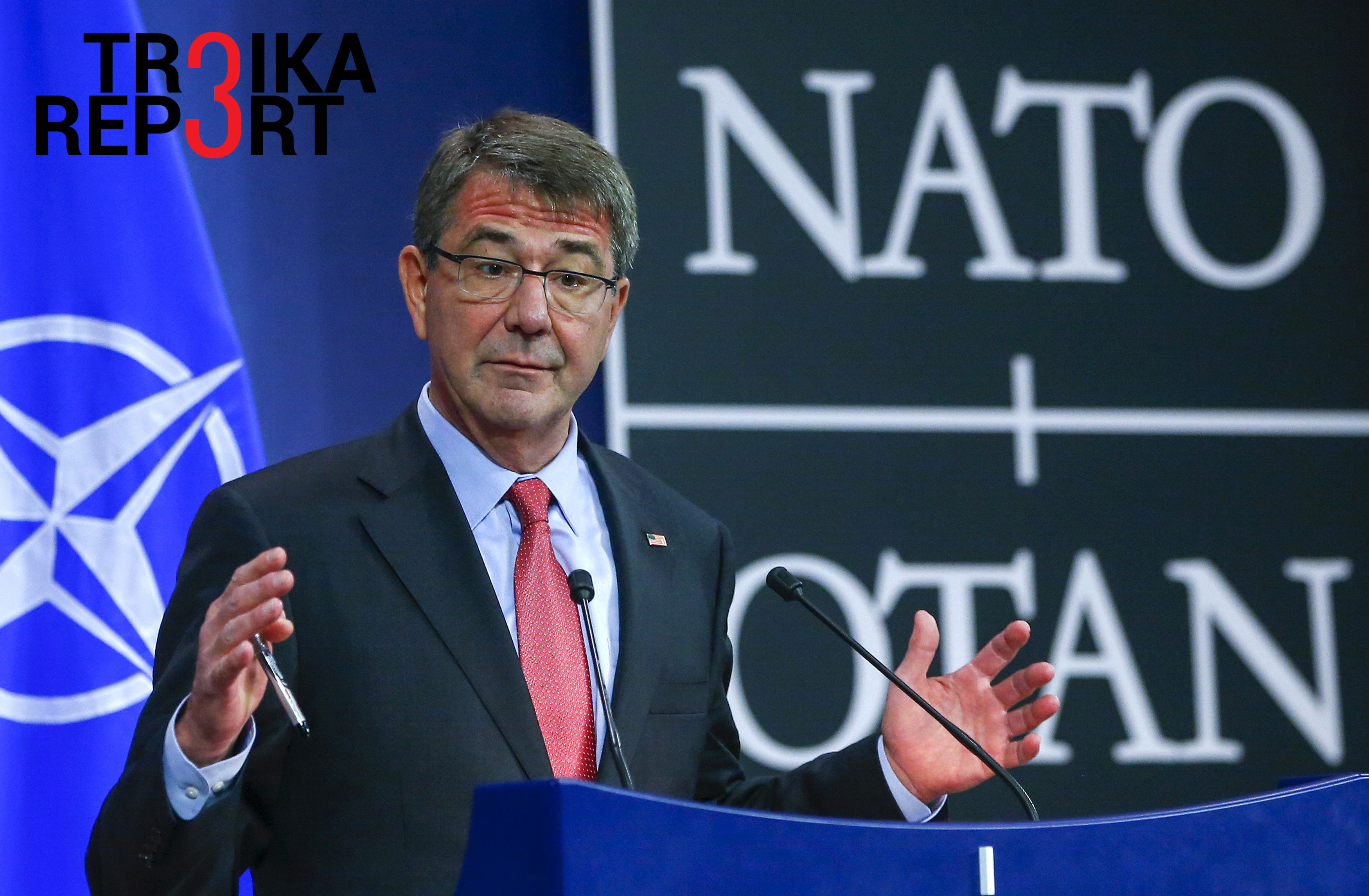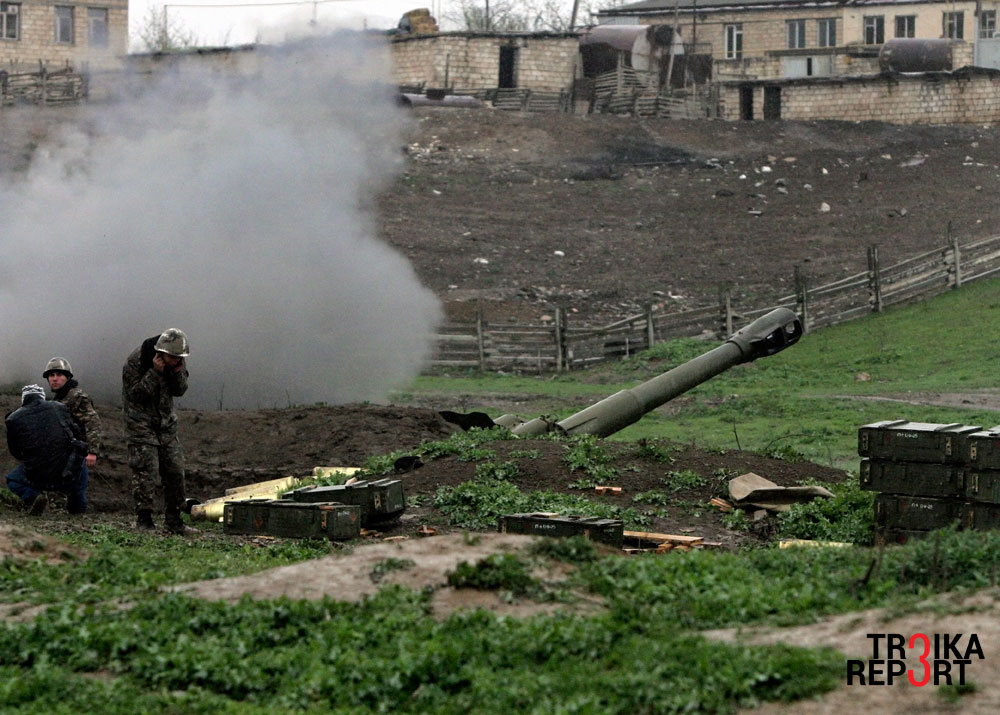Opportunistic Lukashenko seeks benefits by courting Erdogan

Belarusian President Alexander Lukashenko during the OIC summit in Istanbul.
Press photoCredit should be given to Belarusian President Alexander Lukashenko, who lost no time in capitalizing on the invitation to make a speech at the summit of the Organization of Islamic Cooperation (OIC) in Istanbul on 14 April.
In the course of the meeting with Turkish President Recep Tayyip Erdogan on the sidelines of the forum, Lukashenko proposed to “update the agenda and amend the roadmap of [bilateral] relations.”
Paving the way for a warm welcome at the OIC summit, Belarusian Foreign Minister Vladimir Makei emphasized in comments to TV broadcasters on the eve of the event that “we have very close contacts with the Muslim world.” Belarus is a member state of the Non-Aligned Movement and has applied for OIC observer status.
In Istanbul, Lukashenko went further by suggesting the moment is opportune for a “reset” of interaction with Turkey in several key areas of cooperation.
Transit hub for Turkish products
This flirting was almost certainly aimed at bringing solid dividends though the upgrade of trade and economic cooperation. For the moment, trade turnover between the two countries, despite soaring by 20 percent year-on-year in 2015, is estimated at a meager $0.5bn. Belarus does not even list Turkey among its top 10 trade partners.
On the upside, cooperation is gaining momentum. Direct investments in the Belarusian economy by Turkish entrepreneurs skyrocketed in 2015, recording a 400-fold growth. Yet this constitutes only 0.5 percent of the overall volume of foreign investments.
Nevertheless, the trend is positive. Turkish developers are studying opportunities to commit themselves to constructing and upgrading hotels and tourist infrastructure in Belarus. A Turkish cell phone operator is a stakeholder in the third largest Belarusian telecommunication company, while state-owned corporation Bellegprom is entertaining the idea of bringing investors from Turkey on board to inject money and technologies into apparel manufacturing.
Yet this will take some time. In the short term, Belarus might be aiming at the covert status of a transit hub for Turkish goods earmarked for Russia’s domestic market. It is no big secret that once Moscow, hit by the EU sanctions, retaliated by introducing a ban on imports of European agricultural and food products, Belarus profited by becoming the middleman, slightly reprocessing and repackaging goods coming from the West for Russian consumption and labeling them ”Made in Belarus.”
According to popular hearsay, Belarus, which is a landlocked country, has become a major provider of Baltic salmon to Russia. It cannot be ruled out that banned Turkish tomatoes and other produce would be given a Belarusian makeover, masking their origin, and then supplied to Russia with a comfortable profit, given the existing concessions within the Customs Union, of which Belarus is part.
Still, for Turkey it is nothing but small beer. It would be a trickle compared to the flow of goods and services Turkish business was offering Russian customers prior to the breakdown in relations. For Belarus, it would add another income stream, although most probably of a temporary nature.
Belarus’ marriage with Russia is non-negotiable
Russia proper and “White Russia” (as Belarus or Belorussia is translated in English) are intertwined ethnically, historically, culturally, economically and, not the least, geopolitically.
The Belarusian people enjoy a strong and enduring sympathy and respect on the part of their kin in Russia. This is in part down to their ingenuity: SKIF supercomputers jointly developed by Russia and Belarus have made it into the world’s top supercomputers list Top500. It is also because of their fabled tenacity, born out of tragic experience in the Second World War when 25 percent of the population perished, and for their both lively and reserved character, integrity and fairness.
Speaking from the standpoint of an ordinary Russian, our relatives in neighboring Belarus deserve the highest appraisal. We see Belarus-made heavy trucks at our construction sites and buses on the streets. We buy Belarus-made furniture and knitwear. We eat Belarus-made first class dairy products.
It boils down to an axiom: Irrespective of the leaning within the political class and ruling elites in Minsk, no matter what kind of a leadership is in store for the brotherly nation, Belarus’ marriage with Russia is non-negotiable.
Minsk, Europe’s new peace-brokering capital
The overtures made by Lukashenko to Erdogan were most probably dictated by a foreign policy strategy. Belarus under Lukashenko has effectively positioned itself as a negotiation platform for peace-making, projecting an image of the republic and its leader as “honest brokers” and impartial mediators.
Belarus is a member country of the OSCE Minsk Group put together to find a solution to the Nagorno-Karabakh territorial dispute. Minsk has repeatedly advocated a peaceful settlement of the conflict between Armenia and Azerbaijan in compliance with the universally recognized principles of international law.
Engaging Erdogan at the OIC summit could be related to the Belarusian track record of mediation.
However, having noted this consistency by Lukashenko, which is fully in tune with the national interests of Belarus, it might be reasonable not to rule out a secret agreement between Moscow and Minsk to set the stage for a gradual mending of ruptured relations between Russia and Turkey.
After all, Lukashenko had already offered his mediation when addressing an international conference in the Turkmen capital of Ashgabat in December 2015. Notably, the Belarusian president did not side unequivocally with strategic ally Russian President Vladimir Putin in the conflict with Turkey after the shooting down of the Su-24 jet in November. This now provides him with ample room for maneuver.
At the Ashgabat forum, which was attended by Erdogan, Lukashenko called on the warring sides to make mutual concessions and find a sound compromise to restore the former dialogue: “They need… to find an opportunity to make, for a start at least, half a step to meet each other halfway. And the problem will be solved,” he said.
Secret diplomacy? Why not?
Since Belarus and Russia are part of a customs union, the legal framework of the union stipulates, among other things, that the two nations synchronize their foreign policies.
This does not preclude Lukashenko from acting on his own, diverging from what might look like a coordinated approach, and making moves seemingly in contradiction with the interests of Moscow.
The crucial word in the previous sentence is “seemingly,” as Minsk is well aware of the futility of “going it alone” and dumping the only true ally it has in Europe today.
By courting Erdogan, the Belarusian leader is focused on his nation’s immediate needs but at the same time he could be testing the water for patching up the quarrel between Ankara and Moscow. After all, no one has ever succeeded in banning secret diplomacy.
The opinion of the writer may not necessarily reflect the position of RBTH or its staff.
Special section: Troika Report>>>
Subscribe to get the hand picked best stories every week
All rights reserved by Rossiyskaya Gazeta.
Subscribe
to our newsletter!
Get the week's best stories straight to your inbox

